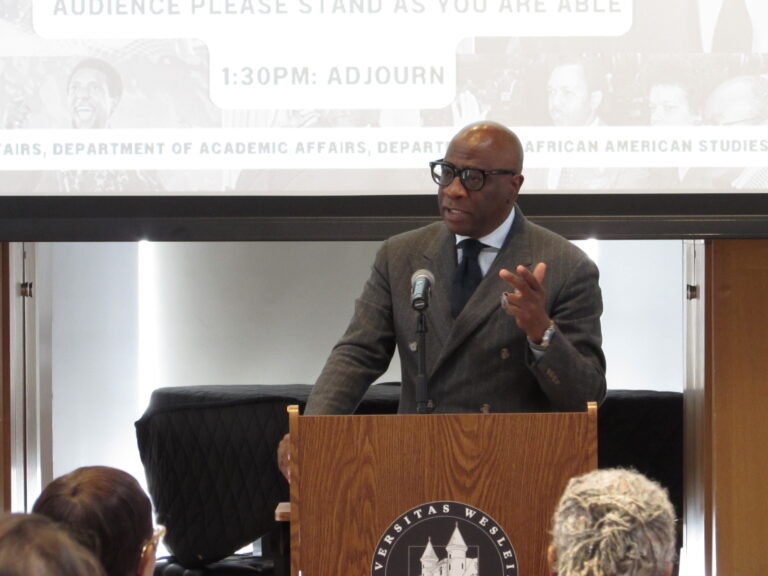Wesleyan Community Responds to Co-education of Residential Fraternities
All residential fraternities at the University are required to become fully coeducational over the next three years, according to an email announcement by University President Michael Roth and Board of Trustees Chair Joshua Boger ’73 on Monday, Sept. 22.
Roth explained that the decision-making process began in the spring of this year.
“I spent the summer thinking about it and talking with some people, but mostly I was weighing all the different responses,” Roth said. “I sent out the memo to the Board of Trustees the first Friday of the semester and then we planned to talk about it at the retreat, which we did. We had a 90-minute session with faculty and student representatives there and then we had another chance to talk about it just with the Trustees. I separated issues of safety and risk from issues of equity and inclusion and so we spent a lot of time on the equity and inclusion piece.”
Vice President for Student Affairs Michael Whaley explained that the University had discussed terminating on-campus Greek life entirely, but decided to search for a compromise instead.
“I think that we were looking for a middle ground that would address some of the salient issues at play here,” Whaley said. “If they can do that, and I actually hope that they can, then I think that will be a good thing. If they can’t, then they won’t be here anymore. But it won’t be because we made the decision that they can’t be here, it’ll be because they were unable to make these transitions.”
Whaley hopes that the experience of Alpha Delta Phi (Alpha Delt) in transitioning to coeducation will be instructive as the other fraternities move forward.
“The folks in Alpha Delt, the current alumni reps, and also some alums who have been members for a very long time have already indicated their interest in working with and sharing information with [Delta Kappa Epsilon (DKE)] and Beta [Theta Pi], in particular, about how they navigated with their national [chapter] because at the time Alpha Delt started [becoming coeducational], the national [chapter] forbade it and DKE and Beta are in that situation right now,” Whaley said.
In 1906, the University provided Alpha Delt with a newly designed, on-campus house that was home to 21 male students. In 1972, two years following the transition to coeducation at the University, rooms began being rented out to female students. Six months following, the brothers invited women to pledge. The first coeducational pledge class of Alpha Delt was initiated in 1973.
As a coeducational fraternity, the University’s chapter of Alpha Delt was subject to regulations imposed by its international organization. For example, women were unable to hold any constitutional positions at their chapters, such as president, vice president, treasurer, and secretary. They were also denied access to business meetings at conventions and were unable to compete or receive prizes in its prestigious literary contests.
After 17 years of conflict with the international organization, an amendment was added to the fraternity constitution stating that the international fraternity—which did not allow women as full members—would negotiate with the proposed Alpha Delta Phi Society in order to agree to a contract between the organizations.
On April 25, 1990, the Middletown chapter and international organization agreed on a coeducational society. According to the Alpha Delt website, the coeducational society’s policy stated that the Middletown chapter is committed to coeducation and the existence of fraternal organizations, advocates for individual chapters to become coeducational on a voluntary basis, and encourages male and female full and equal membership in itsinternational and national organization.
The same policy also notes that it does not support measures to force chapters to become coeducational or unjust economic or housing privileges for single-sex chapters on coeducational campuses.
“I think that coeducation is really positive for Alpha Delta Phi because our spaces aren’t dominated by one particular gender,” said Alpha Delt President Claudia von Nostitz ’16. “From my perspective, it’s really a matter of controlling our space and making sure everyone can feel represented, included, and, most importantly, safe.”
Unlike Alpha Delt, Eclectic did not face substantial issues in becoming coeducational. In May 1970, the Eclectic Society handed over the deed to the house and land to the University in return for renovation. This renovation included rooms for women.
“Eclectic’s association with its Greek letters tends to be a bit more nebulous than some of the other organizations,” Whaley said. “They do have Greek letters but they consider themselves, or have considered themselves, the ‘anti-frat’ for a long time—[I’m] using their words not mine.”
The president of Eclectic declined to comment on coeducation in Greek life at the University. However, Evelysse Vargas ’17, a member of Eclectic, explained the differences she feels when walking into a coeducational space versus an all-male space. She spoke to the advantages of coeducation.
“I do feel differently walking into a fraternity than I do walking into Eclectic or Alpha Delta Phi,” Vargas said. “Fraternities are male-dominated spaces, and I do not identify as a male. As a member and current resident of Eclectic, it’s natural for me to feel more comfortable in that space than in any ‘Greek space’ on campus. Notwithstanding the ‘rivalry’ between Eclectic and Alpha Delt, I would more likely be at Alpha Delt on any given Saturday night than at a single-sex fraternity.”
The status of residential fraternities has been ambiguous and complex for over three decades. In September, 1990, in an attempt to enforce more coeducational Greek life, the University announced that it would cut financial support for single-gender residential fraternities on campus unless they agreed to become coeducational. Eclectic and Alpha Delt were the only coeducational fraternities on campus at the time.
Former University President William M. Chace told The Argus in an October 24, 1990 article that the University could not support organizations that excluded women from a central source of social life on campus.
This policy was fought by some fraternity brothers and, according to the October 24, 1990 Argus article, the administration withdrew all University support, financial and structural, from the residential fraternities due to their lack of compliance.
The current administration faces a similar challenge from fraternity members.
“If they aren’t able or don’t want to [become coeducational], then they would not be recognized by the institution anymore,” Whaley said. “Similar to the situation at Beta right now, students wouldn’t be able to live there or to use the house for any purpose.”
Whaley stated that, although the administration has not received any communication from the DKE or Beta national organizations, he believes the University chapters have been in contact with their national affiliations.
“We met with Beta nationals after the house was closed because they were contemplating their own action with pulling the recognition from our local chapter, but we haven’t heard from them since the Board met and the decision was made about coeducation,” Whaley said.
While the Psi Upsilon national organization permits full membership of women, both the DKE and Beta national organizations do not.
Brothers of DKE expressed their disapproval of the administration’s decision. On Tuesday, Sept. 22, the DKE National Organization responded to the University decision through an online newsletter.
“Delta Kappa Epsilon International Fraternity strongly disagrees with the decision by Wesleyan University to require fraternities to become coed organizations,” the letter reads. “The statement from President Roth does not mention a single specific problem that this decision is intended to resolve, not to mention how or why this step would resolve such problem(s).’”
On Thursday, Sept. 25, the DKE National Organization also released a press release regarding the forced transition to coeducation, including a statement that the coeducation announcement should have mentioned alcohol abuse or sexual assault prevention, two of the central issues confronting the University along with other institutions.
“On its face, the new policy ought to sound an alarm for every student organization on campus, that your freedom to associate with those you care to is subject to oversight, manipulation and elimination, if your group should run afoul of the administration’s view of how the so-called ‘Wesleyan Community’ shall be constituted,” the press release reads. “Even more so, the blatant hypocrisy, manifest intellectual dishonesty and astonishing arrogance underlying the administration’s action should give every person who cares about this University pause, and reason to wonder about actual motives.”
Whaley added that the University anticipates that there may be some issues going forward, especially regarding whether women will want to join residential fraternities.
“I’m not being Pollyanna-ish in terms of thinking that there are no challenges for these organizations down the road,” Whaley said. “Some of the frats may need to shift their focus some. Others, like Psi U, often talk about their credo, and it seems to me that there’s no real reason why women can’t be included or [shouldn’t] be included or shouldn’t want to be included in those principles…. And so the organizations themselves have to do a lot to bring those [principles] in alignment in order to resonate with more people.”
Students at the University have expressed a range of opinions concerning this new policy.
Aimee Jones Wilkerson ’17 expressed her apathy regarding the decision. She said she feels that the environments will not dramatically change.
“My thing is all about venues,” Wilkerson said. “Going out is not necessarily about if it’s a guy- or girl-dominated space, more about who shows up. I think that these spaces aren’t really changed by whether or not they are coeducational. The same people will show up to the events at those places.”
Jacob Seltzer ’17, a member of Alpha Delt, spoke to the advantages of coeducation.
“I think [becoming coeducational] is a step in the right direction, and societies like Alpha Delt will set a positive example for the correct way to transition to coeducation,” Seltzer said.
Several students agreed that transitioning to a coeducational model is just the first step in fixing prominent social issues, particularly sexual assault.
“I want to emphasize the point that coeducation of Greek organizations is just a first step in stopping sexual assault on campus,” von Nostitz said. “There is so much more work we need to do. A great outcome of these changes is the mandatory requirement of all organizations to undergo bystander intervention as well as increasing accountability for us to control and monitor our spaces.”
Vargas concurred, adding that there is still more work to be done.
“At its core, the coeducation of fraternities is beneficial because it creates space for a more diverse group of individuals,” Vargas said. “Simply put, a wider range of voices will be heard. That being said, I don’t believe that the coeducation of fraternities addresses the issues that have been attributed almost exclusively to fraternities on Wesleyan’s campus. Sexual assault and sexual violence can happen anywhere. As a university we need to find an effective way to combat the overwhelming frequency of these crimes.”
Additional reporting contributed by News Editors Millie Dent and Sofi Goode.







It’s about “equity and inclusion” Roth/Boger want the “equity” in your house and then maybe they’ll “include” you.
So since Roth was an Alpha Delt that is the utopian model? Nothing against Alpa Delt, but there is also nothing wrong with adults choosing to live with who they want. This is quite a canard. I hope that the university will be building more housing to absorb those displaced by this new policy… A gulag perhaps?
what this communicates, loud and clear, is that men, unlike women, are not entitled to have their own space. it doesn’t just hurt fraternities, it destroys what they are–which is a place of brotherhood. stating the obvious (no one else is), the type of bonding and comraderie that occur among men, when it is just men, is fundamentally different than what occurs among women, and, yes, it is fundamentally different than the watered down, transient version that occurs in a coed environment. The Wesleyan administration has evidently made the decision that this is no great loss, that freedom of association is not to be cherished, and that a truly pluralistic college campus is not the goal. Soulless conformity and the snuffing out of the masculine spirit is. That is unfortunate.
Well said, I think this quote from DKE national really sums it up well:
“On its face, the new policy ought to sound an alarm for every student organization on campus, that your freedom to associate with those you care to is subject to oversight, manipulation and elimination, if your group should run afoul of the administration’s view of how the so-called ‘Wesleyan Community’ shall be constituted,” the press release reads. “Even more so, the blatant hypocrisy, manifest intellectual dishonesty and astonishing arrogance underlying the administration’s action should give every person who cares about this University pause, and reason to wonder about actual motives.”
It’s amazing to me that so many students are “drinking the kool-aid” here and actually think this will effect sexual assault on campus. Even in this article the author writes “Students at the University have expressed a range of opinions concerning this new policy” yet doesn’t include a single quote of a student disagreeing with the ruling. I guess marginalizing men is seen as ok on campus, but what happens when the attitude changes? It will be too late for fraternities and for free male association on campus.
That struck me too. I appreciate the statement of DKE National. But its really worrisome that the author apparently couldn’t find (or didn’t bother to look for) a single student voice strongly supporting fraternities or college men on campus.
Part of the problem, I think, is the lack of a vocabulary to counter the “gender studies”/quasi-marxist/feminist dreck that has apparently infected the campus hive-mind. The rot goes very deep, starting with the hysteria over “rape culture” itself, which needs to be called out for what it is–a modern day witch hunt.